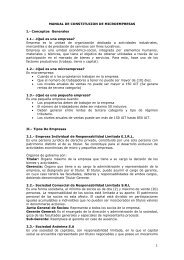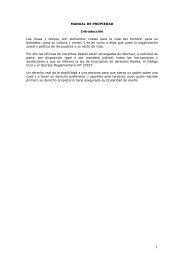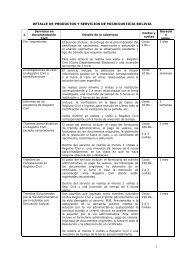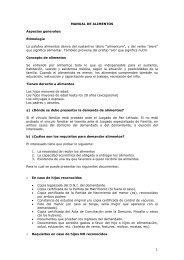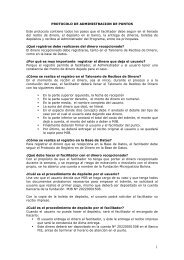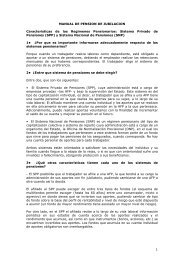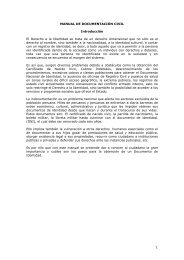ICISS report - International Coalition for the Responsibility to Protect
ICISS report - International Coalition for the Responsibility to Protect
ICISS report - International Coalition for the Responsibility to Protect
Create successful ePaper yourself
Turn your PDF publications into a flip-book with our unique Google optimized e-Paper software.
The <strong>Responsibility</strong> <strong>to</strong> <strong>Protect</strong> 48<br />
6.5 Chapter VIII acknowledges <strong>the</strong> existence and security role of regional and sub-regional<br />
organizations, but expressly states that “no en<strong>for</strong>cement action shall be taken under regional<br />
arrangements or by regional agencies without <strong>the</strong> authorization of <strong>the</strong> Security Council.” It is<br />
interesting <strong>to</strong> note, however, that in some cases that authorization has been after <strong>the</strong> event, as<br />
with <strong>the</strong> approval of <strong>the</strong> interventions by ECOWAS’s Moni<strong>to</strong>ring Group (ECOMOG) in Liberia<br />
in 1992 and Sierra Leone in 1997.<br />
6.6 The general provisions of Chapter VII, <strong>the</strong> specific authorization of self-defence action<br />
in Article 51, and <strong>the</strong> provisions of Chapter VIII, <strong>to</strong>ge<strong>the</strong>r constitute a <strong>for</strong>midable source of<br />
authority <strong>to</strong> deal with security threats of all types. After <strong>the</strong> terrorist attacks of 11 September<br />
2001, <strong>for</strong> example, <strong>the</strong> Security Council (calling in aid both Article 51 and Chapter VII<br />
generally), was quick <strong>to</strong> call <strong>for</strong> action in response – as was <strong>the</strong> General Assembly. The world<br />
already has in place a standing military and diplomatic organization with <strong>the</strong> capacity<br />
(if not always <strong>the</strong> will) <strong>to</strong> deal with <strong>the</strong> whole spectrum of peace, security and human<br />
protection issues: we call it <strong>the</strong> United Nations.<br />
6.7 The Security Council has <strong>the</strong> “primary” but not <strong>the</strong> sole or exclusive responsibility<br />
under <strong>the</strong> Charter <strong>for</strong> peace and security matters. Article 10 gives a general responsibility <strong>to</strong><br />
<strong>the</strong> UN General Assembly with regard <strong>to</strong> any matter within <strong>the</strong> scope of UN authority, and<br />
Article 11 gives <strong>the</strong> General Assembly a fallback responsibility with regard specifically <strong>to</strong> <strong>the</strong><br />
maintenance of international peace and security – albeit only <strong>to</strong> make recommendations,<br />
not binding decisions. The only caveat, meant <strong>to</strong> prevent a split between <strong>the</strong> UN’s two major<br />
organs, is that <strong>the</strong> Security Council must not be discussing that issue at <strong>the</strong> same time<br />
(Article 12). To <strong>the</strong>se Charter bases <strong>for</strong> General Assembly action must be added <strong>the</strong> “Uniting<br />
<strong>for</strong> Peace” resolution of 1950, creating an Emergency Special Session procedure that was<br />
used as <strong>the</strong> basis <strong>for</strong> operations in Korea that year and subsequently in Egypt in 1956 and<br />
<strong>the</strong> Congo in 1960. It is evident that, even in <strong>the</strong> absence of Security Council endorsement<br />
and with <strong>the</strong> General Assembly’s power only recommenda<strong>to</strong>ry, an intervention which <strong>to</strong>ok<br />
place with <strong>the</strong> backing of a two-thirds vote in <strong>the</strong> General Assembly would clearly have<br />
powerful moral and political support.<br />
6.8 The UN, whatever arguments may persist about <strong>the</strong> meaning and scope of various<br />
Charter provisions, is unquestionably <strong>the</strong> principal institution <strong>for</strong> building, consolidating<br />
and using <strong>the</strong> authority of <strong>the</strong> international community. It was set up <strong>to</strong> be <strong>the</strong> linchpin of<br />
order and stability, <strong>the</strong> framework within which members of <strong>the</strong> international system<br />
negotiated agreements on <strong>the</strong> rules of behaviour and <strong>the</strong> legal norms of proper conduct in<br />
order <strong>to</strong> preserve <strong>the</strong> society of states. Thus simultaneously <strong>the</strong> UN was <strong>to</strong> be <strong>the</strong> <strong>for</strong>um <strong>for</strong><br />
mediating power relationships; <strong>for</strong> accomplishing political change that is held <strong>to</strong> be just and<br />
desirable by <strong>the</strong> international community; <strong>for</strong> promulgating new norms; and <strong>for</strong> conferring<br />
<strong>the</strong> stamp of collective legitimacy.<br />
6.9 The authority of <strong>the</strong> UN is underpinned not by coercive power, but by its role as <strong>the</strong><br />
applica<strong>to</strong>r of legitimacy. The concept of legitimacy acts as <strong>the</strong> connecting link between <strong>the</strong><br />
exercise of authority and <strong>the</strong> recourse <strong>to</strong> power. Attempts <strong>to</strong> en<strong>for</strong>ce authority can only be<br />
made by <strong>the</strong> legitimate agents of that authority. Collective intervention blessed by <strong>the</strong> UN<br />
is regarded as legitimate because it is duly authorized by a representative international body;<br />
unilateral intervention is seen as illegitimate because self-interested. Those who challenge<br />
or evade <strong>the</strong> authority of <strong>the</strong> UN as <strong>the</strong> sole legitimate guardian of international peace<br />
and security in specific instances run <strong>the</strong> risk of eroding its authority in general and also<br />
undermining <strong>the</strong> principle of a world order based on international law and universal norms.



